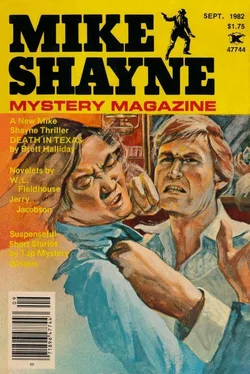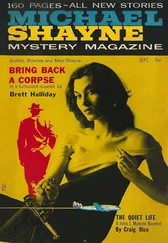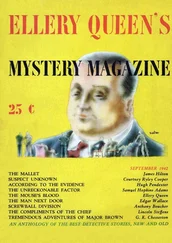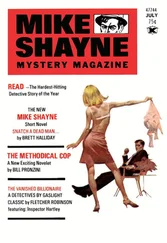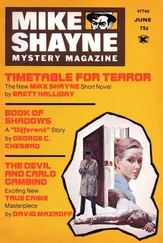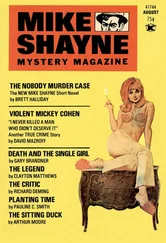Бретт Холлидей - Mike Shayne Mystery Magazine, Vol. 46, No. 9, September 1982
Здесь есть возможность читать онлайн «Бретт Холлидей - Mike Shayne Mystery Magazine, Vol. 46, No. 9, September 1982» весь текст электронной книги совершенно бесплатно (целиком полную версию без сокращений). В некоторых случаях можно слушать аудио, скачать через торрент в формате fb2 и присутствует краткое содержание. Город: Reseda, Год выпуска: 1982, ISBN: 1982, Издательство: Renown Publications, Жанр: Криминальный детектив, на английском языке. Описание произведения, (предисловие) а так же отзывы посетителей доступны на портале библиотеки ЛибКат.
- Название:Mike Shayne Mystery Magazine, Vol. 46, No. 9, September 1982
- Автор:
- Издательство:Renown Publications
- Жанр:
- Год:1982
- Город:Reseda
- ISBN:0026-3621
- Рейтинг книги:4 / 5. Голосов: 1
-
Избранное:Добавить в избранное
- Отзывы:
-
Ваша оценка:
- 80
- 1
- 2
- 3
- 4
- 5
Mike Shayne Mystery Magazine, Vol. 46, No. 9, September 1982: краткое содержание, описание и аннотация
Предлагаем к чтению аннотацию, описание, краткое содержание или предисловие (зависит от того, что написал сам автор книги «Mike Shayne Mystery Magazine, Vol. 46, No. 9, September 1982»). Если вы не нашли необходимую информацию о книге — напишите в комментариях, мы постараемся отыскать её.
Mike Shayne Mystery Magazine, Vol. 46, No. 9, September 1982 — читать онлайн бесплатно полную книгу (весь текст) целиком
Ниже представлен текст книги, разбитый по страницам. Система сохранения места последней прочитанной страницы, позволяет с удобством читать онлайн бесплатно книгу «Mike Shayne Mystery Magazine, Vol. 46, No. 9, September 1982», без необходимости каждый раз заново искать на чём Вы остановились. Поставьте закладку, и сможете в любой момент перейти на страницу, на которой закончили чтение.
Интервал:
Закладка:
“I thought that Chaplin was a stranger to you,” I said, trying to keep my voice steady.
“He was. I had never seen nor heard of him before that night. It was simply his misfortune to come to my aid.”
“What did you do once you left the bedroom that night?”
“I went to the guest house to get ready to face the inevitable people.” Charlotte paused to drag deeply on her cigarette, then continued. “I’m sure that you know I’m not a young woman. The last thirty years of my life have been devoted to preserving my youthful appearance. There are many things I must do to create the illusion. Lotions, exercises, diet, and, of course, cosmetics. It takes me well over an hour to apply my make-up each morning. That’s why I refuse to see anyone until eleven.”
As she spoke, Charlotte Page seemed to age visibly, and, by the time she finished, an old woman sat across from me.
“But why?” I asked gently. “If you didn’t know Chaplin and he jeopardized his own life to save you, why did you kill him?”
Her eyes opened wide then, and she looked at me as though her motive had been apparent from the start.
“Because, Lieutenant,” she explained softly, “he saw me without my make-up.”
John, The Confidence Chap
by Arthur Moore
What a daring scheme: take the robbing hoods in Sherwood Forest and turn them into Good Guys. Ridiculous! And yet —
It was a clear day in Sherwood forest as John Goodfellow drew rein and climbed from his horse. Several green clad clods surrounded him, and one put an arrow to his bow.
“Hold there,” said Goodfellow, “I come in peace.” He was a tall, sallow specimen with a glittering eye. He took a step toward the leader and doffed his brown cap.
“A college man,” said the leader with a sigh. “What’s your game, stranger?”
“I came to see you, sir. Are you Robbing Hood?”
“Yes, of course. Who else? Your purse please.” Hood held out his hand.
John Goodfellow smiled. “I’ve a proposition for you, Mr. Hood. I’m a publicity man...”
“Publicity!” growled a huge man at Hood’s side. “That’s the last thing we need. Hand over dat purse.”
“Yes indeed, the purse,” Hood said. “We’re crooks, you know.”
“I dig,” said Goodfellow. “Don’t misunderstand me. You need the right kind of publicity — and that’s where I come in. Suppose we shoot a few acorns into the trees and see where they land? My business survey shows that you have a problem.”
“Quite,” said Robbing. “Our main problem is staying out of gaol.”
“Also,” said Little John, the large fellow, “eatin’ regular.”
“Exactly,” agreed John Goodfellow, beaming at them. “And what do you do about it? You go out and rob people — right? That gets you a bad name.”
“All crooks have bad names, lout!” Large Little John looked down a long nose.
Goodfellow shrugged. “Not necessarily. I can fix it so hardly anyone will call you crooks — for a pittance.”
Robbing was startled. “So that no one will call us crooks?” He came closer, narrowing his eyes. “You can fix it?”
“How much?” asked Little John, suspiciously.
Goodfellow consulted a bit of paper he took from his tunic. “One hundred pieces of silver per annum, and a lifetime pass through the forest.”
Little John jumped into the air, shouting. “Who’s the crook! You or us?”
“I have a plan,” Goodfellow said, nervously. He could see the blokes fingering their bows.
“That’s a lot of loot, Goodfellow,” Robbing said, drawing a dirk and testing its edge. “Let’s hear the plan.”
“Well,” Goodfellow said quickly, “the first thing I’d do is change your image. Now you’re a crook and the people hate you. You must be made lovable.”
Little John guffawed, to Robbing’s annoyance. “That ain’t going to be easy.”
“Proceed onward,” Robbing said, glowering at the large lout. “I believe I spot the direction of your drift. I’d be billed in all the shires as Robbing, the lovable thief?”
“Sheeesh!” said Little John.
“No.” Goodfellow shook his dark head. “That’s not quite what I had in mind.”
“Robbing, the friendly brigand?”
“Close, but not on the shilling. You must become a living legend in your own time. People have got to have confidence in you.”
Little John snorted. “Right now they know that if they come to the forest they’re gonna get mugged. Ain’t that confidence?”
“The wrong kind. It’s bad, very bad.”
Robbing flicked the dirk at a tree trunk. “Really, old boy. How else are we going to glom their gold?”
“Aye,” agreed the large man, “and we only shoot five out of seven.”
“Excuse me,” Goodfellow sighed. “You’re old fashioned, and behind the times. Try this on your dulcimer. What if you only robbed some of the people? Then—”
“Some of them!?” shouted Little John. “Some of them! You want we should go on the dole?”
Robbing retrieved the dirk and began to hone it, motioning the glowering green clad lads to close in. “So far, Goodfellow,” he said, “that’s the worst argument I ever heard.”
“You’re fighting me,” protested Goodfellow, “hear me out. What I’m trying to say is — what if you only robbed the rich?”
“Sheeeesh! That’s what we try t’do now. Poor folks ain’t got a farthing — not after taxes.”
“Quite so,” agreed Robbing. “We rob the rich by all means. As often as possible. Goodfellow, you are—”
“Wait a minute! Hear me out! I can arrange that the news is broadcast to all that you only rob the rich! When can you lose by that? You admit you couldn’t live a fortnight on the poor — right?”
“Right,” growled Little John. “It don’t pay to knock ‘em on the noggins.”
“I haven’t finished. We’ll bill you as Robbing, the protector of the poor and downtrodden. It’ll make you famous! Robbing, the friend of the poor.”
“It’ll make us poor,” snarled Little John.
“Famous?” said Robbing. “It’ll really make me famous?”
“Absolutely,” Goodfellow said. He frowned. “That’s not much of a name — Robbing. What if we call you Robin? Robin Hood?”
“Splendid,” Robbing said, giggling. “The famous Robin Hood.” He put the dirk away.
“Wait, there’s more,” Goodfellow said, motioning them to come closer. “We’ll carry it a step farther. I’ll spread it around that you rob from the rich and give to the poor.”
“You’re trying to ruin us!” screamed Little John.
“I don’t much care for the sound of that ,” Robin said, looking askance.
“What could it cost?” said Goodfellow. “Besides, the poor folks would be your allies — think of it that way. They’d be allies and spies. The Sheriff couldn’t move without you knowledge — they’d see to it.”
“Hmmmmm,” said Robin.
“Every stew-bum in England would be on our doorstep,” growled Little John. “We’d be running a bread line.”
“Ugh,” said Robin.
“You’re not looking at the broad picture,” Goodfellow pointed out. “With the ‘rob from rich, give to poor’ angle, you couldn’t help becoming famous. No crook in history every thought up such a gimmick.”
Robin brightened. “You’re absolutely positive I’d be famous?”
“I guarantee it. It’s surefire.”
“But,” whined Little John, “couldn’t we keep some of the loot — maybe most of it?”
“Who keeps books?” Goodfellow nudged Little John and chuckled. “Feed the poor slobs — find ‘em jobs... you know.”
Robin clapped his hands. “And I’ll be famous. We’ll do it. It’s a deal we accept.” He shook hands with Goodfellow. “Little John, pass the word. Everyone must know.”
Читать дальшеИнтервал:
Закладка:
Похожие книги на «Mike Shayne Mystery Magazine, Vol. 46, No. 9, September 1982»
Представляем Вашему вниманию похожие книги на «Mike Shayne Mystery Magazine, Vol. 46, No. 9, September 1982» списком для выбора. Мы отобрали схожую по названию и смыслу литературу в надежде предоставить читателям больше вариантов отыскать новые, интересные, ещё непрочитанные произведения.
Обсуждение, отзывы о книге «Mike Shayne Mystery Magazine, Vol. 46, No. 9, September 1982» и просто собственные мнения читателей. Оставьте ваши комментарии, напишите, что Вы думаете о произведении, его смысле или главных героях. Укажите что конкретно понравилось, а что нет, и почему Вы так считаете.
